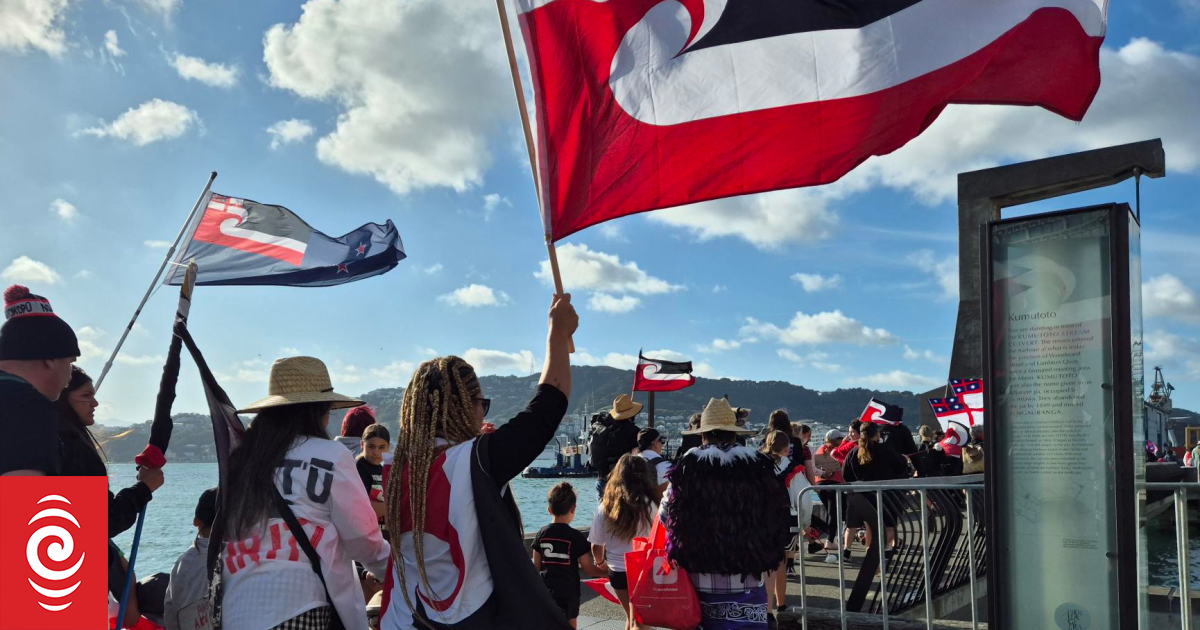Heremia said she is a “proud Māori” and the Tino Rangatiratanga flag for them “is not just a symbol, it is a powerful representation of our culture, our identity and our history.”
Photo: RNZ / Emma Andrews
Thousands of workers, unions, and iwi are gathering across the motu today for Rā Whakamana, a nationwide day of action calling for dignity, fairness, and tino rangatiratanga.
The organisers describe it as a tikanga-led stand for cultural wellbeing, mana wāhine, rangatahi, workers’ rights, and tino rangatiratanga, guided by iwi leadership in partnership with the union movement.
The day of the activation – October 28 – carries significance as it marks the signing of He Whakaputanga o te Rangatiratanga o Nu Tireni (the Declaration of Independence of the United Tribes of New Zealand) in 1835 and the first Labour Day demonstrations in 1890, when thousands of workers united for fair treatment and justice.
Māori rights activist and one of the key leaders of the activation Ken Mair said Rā Whakamana is more than a protest.
“On this day in 1835, our tūpuna signed He Whakaputanga, the Declaration of Independence, reaffirming our rights as hapū, asserting our mana motuhake and declaring that our authority in this land rests with us, the people of Aotearoa,” he said.
“On this same date in 1890, thousands of workers across the motu stood together in unity, demanding for treatment of dignity and justice in our workplaces.”
That “courageous action” became what we know now as Labour Day, Mair said.
“In 1835 and 1890 and now in 2025, the 28th of October continues to stand as a day of solidarity, unity and collective action.”
Activations are taking place from 12pm to 2pm across Aotearoa, including hīkoi and peaceful demonstrations in main centres and regional towns.
Ken Mair, chair of Wai Māori Trust
Photo: RNZ / Leigh-Marama McLachlan
Mair said the kaupapa responds to what they describe as ongoing attacks on Māori, workers, and communities – pointing to the Government’s removal of Treaty clauses from legislation, stalled pay equity claims, the proposed Regulatory Standards Bill and the recent decision from the government to forge ahead with plans to change the law governing New Zealand’s foreshore and seabed.
He said those decisions undermine Te Tiriti o Waitangi, harm cultural wellbeing, and threaten the rights of future generations.
“We have lost all confidence in this government to deal with fairness and integrity,” Mair said.
“We have followed every official process available to us. We have written petitions. We have made submissions. We have appeared before select committees. We’ve gone to court investing, spending millions of dollars in pursuit of justice.”
He said even when the Courts rule in their favour “the government moves to overturn those decisions” – pointing to the recent foreshore and seabed legislation and women’s pay equity claims.
“It continues across multiple areas where justice is denied. We say to you all, this is not democracy. That is dictatorship.”
Mair put a call out to Tangata Whenua and Tangata Tiriti to stand united, and “say clearly, enough is enough.”
“This is not just a protest. It’s a statement of hope, solidarity and determination by us all.
“He Whakaputanga lives on, the struggle for justice continues and together we will prevail.”
Sign up for Ngā Pitopito Kōrero, a daily newsletter curated by our editors and delivered straight to your inbox every weekday.

